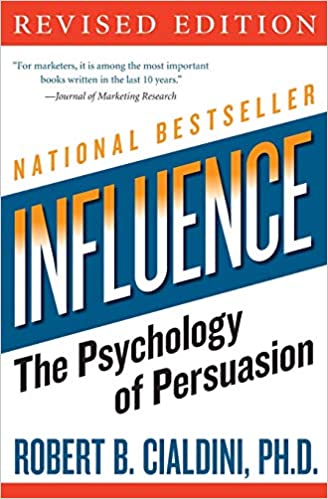You’ve done it. Your business is your own. There are no more bosses stressing you out, no more coworkers pestering you, and you have the freedom to choose which projects you want to take.
One issue, though.
You have to start your business as a business, and that means growing it. You may feel like you’re not ready for that step yet, but these upcoming skills will help you kickstart your growing business.

Influence
by Robert Cialdini
⏱ 16 minutes reading time
🎧 Audio version available
Problem-Solving Skills
A benefit of working without a boss is also a setback. When there’s trouble or a conflict, there is no one to tell you what to do. At first, this may come as a relief. Then when there’s a fuming client or a ruined project, there is no one to tell you what to do becomes a lot more daunting.
This is why problem-solving skills are such an important business skill, especially for those with low to no experience dealing with clients.
What does problem-solving entail?
Critical thinking, for one. Critical thinking means that you need to be objective about a given situation, to ask questions, and to determine the root for the problem and an eventual solution.
In a nutshell, there is no need to panic about a problem. Approach it with a levelness to be envied. That’s the most important step towards properly solving any issue. If the first solution fails, stay on top of your game by having a second and a third solution prepared. And there you go. Who needs bosses anyway when you can solve your own problems?
Time Management Skills
You’re never going to get far in any business, never mind freelancing, if you don’t have a handle on your time management.
As a freelancer, there is no boss or coworkers around to keep you on task.
So, our number six most important and essential business skill is “time management.”
Without anyone around you in a professional environment to add external pressure, you need to keep yourself in check. Making schedules is now a necessity, not just a way to stay organized.
Part of being skilled at time management is to create schedules and keep to them. This even leads to maximizing the amount of work you get done, which means you’ll maximize your income. Most freelancers don’t bill by the hour, but by the job, so you’ll be earning more because you’re able to accomplish more in less time.
The hurdle to get over to be as efficient as possible is to schedule the amount of work every task needs, to highlight meetings with clients, and separate a chunk of time in order to deal with invoices and finance– this is actually another skill, which will come up later, so stay tuned!
Interpersonal Skills
There are no more buffers between you and clients, so you need to communicate with others– a lot. Again, you need to be as efficient as possible. Part of getting a handle on interpersonal skills– the ability to communicate or interact well with others — is being able to communicate in an efficient, precise, and succinct manner.
Another aspect of being a skilled communicator is understanding what the other side– the client– is trying to say. Empathy is a necessary skill for any business owner, especially freelancers.
If you truly want to grow your business, you need to take these skills up a notch. That means when you’re communicating with a client, you’ll need to practice reading between the lines. It also means understanding a client’s expectations, even if they are not expert communicators. And finally, it means being able to spot a red flag and knowing that further business with said client won’t do your business any good.
Here are a few other ways communication comes in handy in the freelancing business:
Being able to clearly communicate what your business offers.
Being able to network with fellow freelancers in your field.
Being able to ask the right questions– to clients and other freelancers alike, to better understand what they truly want.
And lastly, being able to take and benefit from feedback from clients.
Most of the time, the most common way of communicating with clients is through email and the occasional phone call instead of face to face meetings. All of these methods have challenges. With email and phone, you need to be able to portray your tone correctly in order to avoid being misunderstood or misinterpreted.
Website Building Skills
Regardless what business you’re in, being familiar with website building is an essential skill for any business. Never mind the fact that someone will pay you very well to help them build their website, you need to be able to build your own website.
There are countless affordable, low-cost, and even free online classes that teach coding. If building something from scratch isn’t your cup of tea, learning to use a platform, like WordPress, which is leagues easier learning to master.
With WordPress– or similar platforms– the struggle is more centered on the actual content you post. Whether or not you’re used to writing, you need to at least present your business.
Pricing and Budgeting Skills
In order to grow your freelancing business, you need to learn to run it like a real business, and that comes with the nitty-gritty bits of business– aka, budgeting.
Budgeting means knowing how to keep track of your earnings. It means knowing your way around invoices. It means keeping track of every dime that goes in and comes out of your business.
But good news! Chances are that you’re a one-person business, so you only need to worry about working out the payroll thing just yet. Your expenses are also probably pretty low.
Now, here is one of the biggest financial challenges as a freelancer– one that we’ll walk you through. There is a stark difference between being an employee and being a freelancer. Working as an employee means you don’t need to worry about pricing your work and putting a value on your efforts. Employees have either a set salary or an hourly rate. They’re also not responsible for setting a quote to charge clients– that’s up to your boss.
However, being a freelancer means that you need to evaluate your work and its quality, and put a price on it.
In order to trust you, clients need a clear quote or an estimate of how much you charge– that’s whether you’re a programmer, a designer, an artist, a writer, et cetera. There’s a problem with budgeting for freelancers nowadays, especially with new ones. They tend to underestimate how much they need to charge for practice. They end up spending way too much time and effort, but not making nearly enough money.
When you set the price, find a healthy middle ground between you and the clients. Not too low– for your sake, and not too high– lest you lose the project to a less costly freelancer.
Negotiation Skills
Or the less formal term for it: haggling. Negotiation skills will save your life. They’re something you need from the get-go. Negotiation starts with convincing— as in convincing your client they need you and your skills and no one else.
See, when a client approaches you — or vice versa– there is a high chance that they have met with numerous freelancers before you and they are not afraid to meet with more after you. That means that when the moment comes you need to close a sale and agree upon a price, so, you need their full attention.
Contrary to what some believe, you don’t have to be an expert manipulator or a professional salesperson to negotiate. What you can do is prove to clients exactly why you’re the freelancer for them and why they need to hire you.
Freelancers especially have it hard when it comes to negotiation skills because of the lack of in-person meetings with clients. This is why we said earlier that a lot of these skills overlap. If you need to negotiate, it’s probably going to be through email or phone calls.
Related: Money Management Tips and Tricks for Freelancers
Organization Skills
And finally, it all comes to this. While all the previous points are beyond integral in a successful freelancer’s life, the mother of all these skills is the one that ties them up in a neat bow: organization. Employees have designated office spaces, file rooms, procedures to follow, a hierarchy to report to, and a lot of other things freelancers don’t. Most freelancers work from home, which can lead to being unorganized.
You are all on your own when it comes to organizing yourself and your work. Organizational skills directly correlate to how well clients perceive you and how well you’re able to serve them.
What Is Snapreads?

With the Snapreads app, you get the key insights from the best nonfiction books in minutes, not hours or days. Our experts transform these books into quick, memorable, easy-to-understand insights you can read when you have the time or listen to them on the go.


